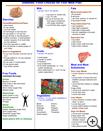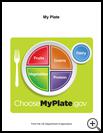
Diabetes: Managing Your Diet
________________________________________________________________________
KEY POINTS
- There are several ways to plan meals to help manage diabetes. Your diabetes care provider will help you find a meal plan that works for you.
- Most plans are based on counting carbohydrates (carbs) in food because carbs have the biggest effect on your blood glucose level. Carbohydrates, also called carbs, are a source of energy for your body. Carbs are found in foods such as fruit, soft drinks, candy, pasta, bread, cereals, rice, potatoes, beans, peas, leafy vegetables, and fruits.
- It is important to meet with a dietitian to develop a meal plan that fits your taste, budget, and lifestyle.
________________________________________________________________________
Why is it important to manage my diet when I have diabetes?
Having diabetes means that there is too much sugar (glucose) in your blood. Your body breaks down some of the foods you eat into sugar. Your blood carries the sugar to the cells of your body. You need the sugar in your cells for energy, but too much sugar in your blood is not good for your health. Your body uses insulin to help move sugar from the blood into the cells.
Diabetes is a problem with the way your body makes or uses insulin. Insulin is made by the pancreas, which is an organ in your upper belly. Type 1 diabetes happens when your pancreas stops making insulin. Type 2 diabetes happens when your pancreas doesn’t make enough insulin or your body becomes unable to use the insulin. When your body does not have enough insulin or has trouble using insulin, sugar builds up in your blood and cannot get into your cells.
Type 1 diabetes is treated with insulin, but food choices and exercise are still very important parts of managing your blood glucose and preventing complications. The goal of food choices is to try to keep your blood glucose at a normal level throughout the day. This is done by matching your insulin doses with the types and amounts of food you eat. Meal plans can be designed to fit your lifestyle.
With type 2 diabetes, sometimes you can control your blood glucose with just diet and exercise. Or you may also need to take oral medicine or insulin shots.
In all cases, understanding how the food you eat affects your blood glucose is an important part of taking good care of yourself.
What are the types of meal plans?
There are several ways to plan meals to help manage diabetes. Your diabetes care provider will help you find a meal plan that works for you. Most plans are based on counting carbohydrates (carbs) in food because carbs have the biggest effect on your blood glucose level. Carbohydrates are a source of energy for the body. There are three basic types of carbs: starches, sugars, and dietary fiber.
- Sugars such as glucose and fructose raise blood glucose very quickly. Sugar is found in foods such as fruit, milk, soft drinks, baked goods, and candy.
- Starches are found in plant-based foods such as pasta, bread, cereals, rice, potatoes, beans, and corn. Some starches are converted to energy very quickly, but others, such as whole grains, are converted more slowly.
- Dietary fiber is the part of plants that cannot be digested. Fiber is found in whole-grain bread and pasta, beans, peas, leafy vegetables, raisins, prunes, apples, and berries. Fiber can help control blood glucose by slowing how quickly your body absorbs sugar from foods.
The most common types of meal plans are:
- The Plate method: This is an easy way to make healthy food choices and control portions, carbs, and calories. Fill half of a 9-inch plate with nonstarchy vegetables. One fourth of the plate should have starches such as whole grains and vegetables like potatoes. The last quarter of the plate is for proteins such as lean meat. You can have a portion of low-fat milk or yogurt and fruit on the side. You can also add small amounts of healthy fat. This way of planning your meals is focused on getting more vegetables and less starchy foods. This helps to control blood glucose.
- Carbohydrate counting meal plan. This plan helps you figure out the amount of carbs in the foods you eat at each meal or snack and match your insulin dosage to that carb amount. This plan works best if you take insulin with each meal.
- Constant carbohydrate meal plan. With the constant carbohydrate meal plan, you eat a set amount of carbohydrates at each meal and snack. You take insulin or other diabetes medicines at the same times and in the same amounts each day.
- Exchange meal plan. This plan divides foods into starch, fruit, milk, fat, vegetable, and meat groups. The plan gives you serving sizes for foods in each group that have about the same amount of carbohydrate, protein, fat, and calories. This lets you exchange, or swap, choices from a food list.
It is important to meet with a dietitian to develop a meal plan that fits your taste, budget, and lifestyle.
What is a healthy way for me to eat?
- Eat a well-balanced diet. Focus on eating a balance of fresh vegetables and fruit, low-fat dairy, lean meats and fish, beans, whole grains, and use healthy fats such as canola and olive oil.
- Manage carbohydrates carefully. Carbs affect your blood glucose level more than protein or fat. You need to balance how much insulin you take with the amount of carbs you eat. This helps keep your blood glucose at a healthy level and helps prevent many health problems. Testing your blood glucose 2 hours after a meal will help you find out how eating different combinations of foods can affect your blood glucose. Learning how your body responds to foods will help you improve your blood glucose control.
- Eat meals at the same time each day. Insulin and oral diabetes medicines will lower your blood glucose whether you eat or not. It’s important not to miss meals. Try to eat at about the same time each day to prevent low blood glucose. Carry snacks in case you have a change in your schedule that affects your mealtime.
- Use snacks to prevent insulin reactions. Snacks help to keep your blood glucose from going too low after you take insulin. Different types of insulin reach peak activity, at different times, and insulin peaks vary from person to person. You will learn from experience when you need a snack. Different types of snacks have different effects. Sugar from fruit will last 1 or 2 hours, so fruit is good for a morning or afternoon snack. Carbs eaten with proteins, such as low-fat cheese or meat, change to sugar more slowly. If you have low blood glucose during the night, you can add a lean protein to your evening carbohydrate snack. This can help the sugar last through the night. Milk and yogurt are a natural mix of carbohydrate and protein and make a good bedtime snack choice.
- Limit cholesterol, saturated fat, and trans fat in your diet. Eating too many foods high in cholesterol, saturated fat, or trans fat can lead to high levels of the fatty materials in your blood called cholesterol and triglycerides. High cholesterol increases your risk for heart disease. People who have diabetes have a higher risk of getting heart disease, so it is important to watch the cholesterol and fat in your diet. Check food labels for the amounts of cholesterol, saturated fat, and trans fat.
Blood cholesterol and triglyceride levels can be high if blood glucose levels are too high. Your blood cholesterol level and triglyceride level should be checked at least once a year. Your dietitian can help you adjust your diet if you need to.
- Keep a healthy weight. Ask your dietitian how many calories you need to eat every day. If you are overweight, talk to your dietitian about making a plan for gradual weight loss. Losing weight will also make it easier to control your blood glucose.
- Eat more fiber. Fiber is the part of plants that cannot be digested. Adding fiber may help lower blood glucose levels. For example, your blood glucose may not be as high after eating beans than it is after eating white bread because beans have more fiber. Raw fruits, vegetables, beans, nuts, oatmeal, popcorn, and whole-grain breads are good high-fiber foods.
- Avoid foods high in salt (sodium). Eating a lot of salt may raise your blood pressure. High blood pressure increases your risk for stroke and complications of diabetes, such as heart, eye, and kidney problems. Try to eat no more than 1500 milligrams (mg) of sodium each day. Talk to your dietitian about salt.
- Avoid eating too much protein if you have kidney problems. Eating too much protein can be a problem if you have kidney disease. Follow your healthcare provider's recommendation for how much protein you should eat. A dietitian can help you plan a lower protein diet.
Is it OK for people with diabetes to drink alcohol?
If you have diabetes, be careful about drinking alcohol. Too much alcohol can make blood glucose levels fall too low. Drinking even a small amount of alcohol on an empty stomach can lead to a very low blood glucose. If you take insulin or diabetes pills, you have an even greater risk for low blood glucose because alcohol increases the effects of the medicine. If you take some diabetes medicines with alcohol, it can cause serious health problems. Always ask your healthcare provider if it is safe to drink alcohol with any medicines that you take.
For more information, contact
- The American Diabetes Association
800-342-2383
http://www.diabetes.org


